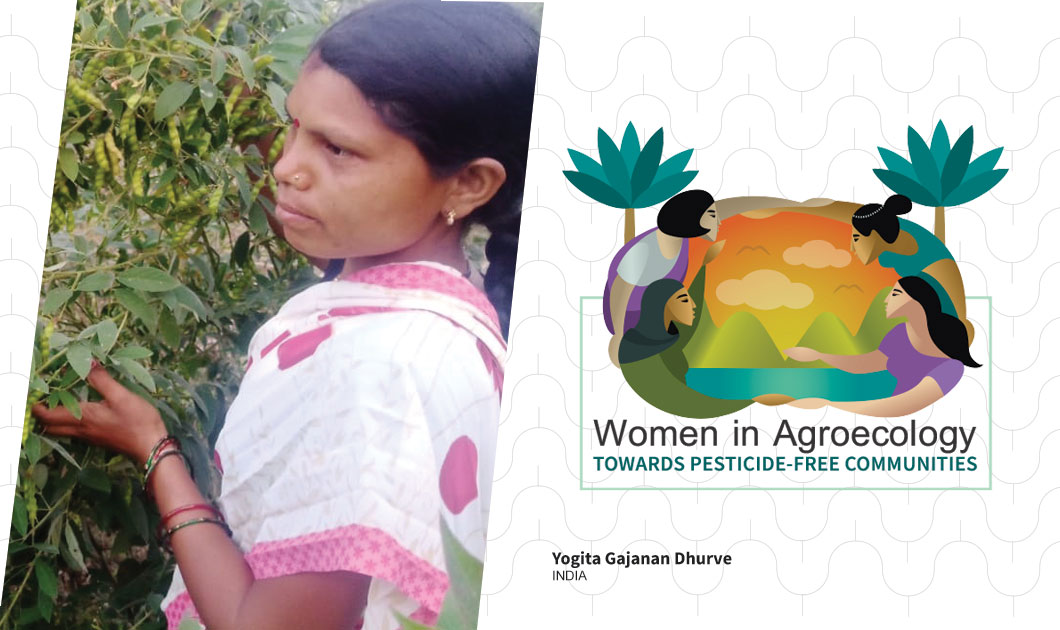The contribution of women in agriculture is well known. Women participate in everything from field preparation, sowing, weeding, to harvesting and cleaning. In India, many women farmers are adopting new and creative methods of farming, including agroecology, to find solutions to their problems. One such woman is Yogita, a farmer from the village of Chandrapur, Yavatmal District, Maharashtra.
Yogita Gajanan Dhurve, 35, got married at the age of 19. Coming from an agricultural family, she started farming in 2012 in the conventional chemical-intensive method that was practiced by most farmers in Yavatmal. After three years of conventional farming, she realised that the expenses incurred from chemical inputs are very high. Each year, the expenses keep getting higher with no increase in the quantity of yields. She and her husband went through their expenses, yields and profit and understood that there is very little profit to be made. They needed to think of something else to survive.
Around that time, they heard about an organic farming training in Hyderabad led by an organisation named Umand. Yogita decided to attend the training where women from other places in India also participated. She came to know of several agroecological farming methods, including how to make organic inputs that can be used as alternatives to chemical pesticides and fertilizers.
Yogita started to experiment on organic farming first on one acre of land, growing toor daal (red gram) and jowar (sorghum). She applied various organic inputs such as neem oil emulsion and khanajeevamrut (organic manure), and used different pest repellent methods such as light traps and yellow traps in the fields. Within three years, she gained a lot of experience and achieved good results. This encouraged her to expand organic farming to five acres. She also acquired farmer-led certification through the Participatory Guarantee System.
Yogita and her husband are also farming crops for their household consumption. Wheat, jowar and toor daal are cultivated in the fields, while onion, tomato, green chili and other vegetables are grown in their kitchen garden. They maintain six to seven vermicompost units. Cow dung and cow urine from their own cattle are used for preparing organic inputs. Not anymore dependent on commercial seeds that require chemical inputs, they are now using their own treated seeds for next year’s planting season.
For the last three years, Yogita and her husband have not needed to go to the hospital because of any illness. They attribute this to eating good organic food from their own farm. “We are very happy. Our expenses are much reduced. We are getting good yield and high-quality products that are sold very easily,” she said.
Spiders, butterflies and birds in their fields have noticeably increased. They set up dwellings for the birds where they can sit and can eat pests in the fields. They observe that parrots, in particular, are highly effective in pest control.
Yogita and her husband also planted many varieties of fruit trees like mango, chikko, and lemon. When they were practicing chemical farming, edible plants were not present in the fields. Now, edible plants are thriving. Elderly farm workers helped them identify these edible plants, since most of the knowledge on their use and preparation have been lost to the younger generation.
In her village, Yogita is called as “krishi sakhi,” meaning, “friend to agriculture.” Now considered as a master trainer on organic farming, she has trained many women farmers on agroecology practices since 2015. In 2022, she was awarded the Jaivik India Award in recognition of her expertise in the field of organic and natural farming. She is currently part of a big network of organic farmers in the state of Maharashtra.
Yogita is very proud that she is an organic farmer and an independent, self-sufficient woman from the very small village of Chandrapur. She is grateful for the huge amount of support given by her family and the entire community. ###
Women In Agroecology: Towards Pesticide-Free Communities is a continuing storytelling initiative of PAN Asia Pacific and its partners to document stories of rural women who are survivors of pesticide poisoning and/or making the transition to agroecology.
Our contributing partners: Shikkha Shastha Unnayan Karzakram (SHISUK), Bangladesh; Society for Rural Education, India; Gita Pertiwi, Indonesia; Thanal Trust, India; PAN India; and Sustainable Agriculture and Environment Development Association (SAEDA), Laos








Discussion about this post